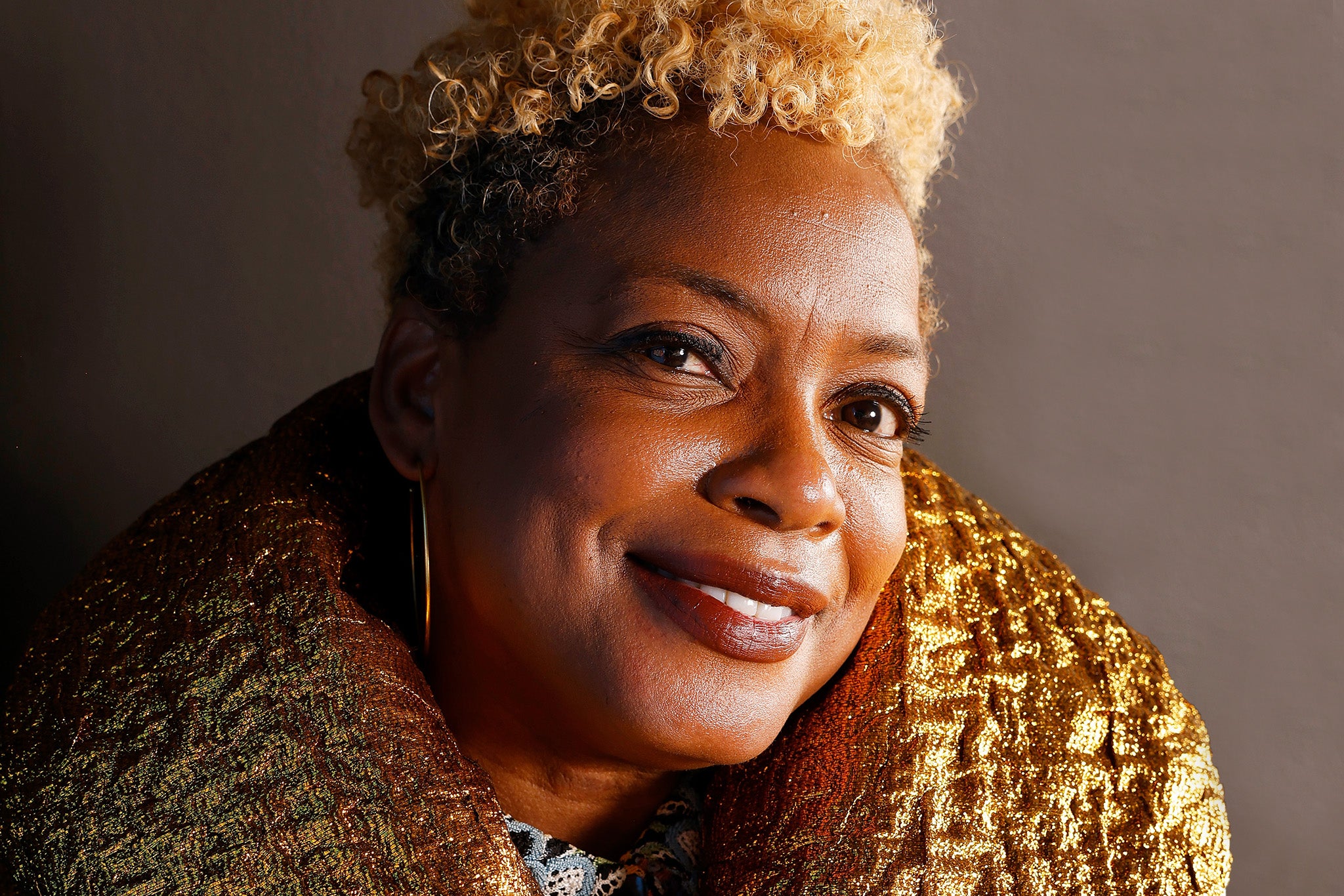Aunjanue Ellis-Taylor on Origin, Will Smith and how The Color Purple failed Black lesbians: ‘It’s not just a story about sisterhood’
The Oscar-nominated star of ‘King Richard’ speaks to Nicole Vassell about her provocative new film, why she handed out flyers to promote it at an LA cinema, and the ‘two prominent men’ who thanked her privately when she came out as bisexual


Your support helps us to tell the story
From reproductive rights to climate change to Big Tech, The Independent is on the ground when the story is developing. Whether it's investigating the financials of Elon Musk's pro-Trump PAC or producing our latest documentary, 'The A Word', which shines a light on the American women fighting for reproductive rights, we know how important it is to parse out the facts from the messaging.
At such a critical moment in US history, we need reporters on the ground. Your donation allows us to keep sending journalists to speak to both sides of the story.
The Independent is trusted by Americans across the entire political spectrum. And unlike many other quality news outlets, we choose not to lock Americans out of our reporting and analysis with paywalls. We believe quality journalism should be available to everyone, paid for by those who can afford it.
Your support makes all the difference.Two years ago, Aunjanue Ellis-Taylor won a long-deserved Oscar nomination for playing Venus and Serena Williams’s mother in the biopic King Richard. Starring opposite Will Smith – who played the sisters’ fierce tennis coach and dad Richard Williams – Ellis-Taylor’s refined portrayal of the family’s matriarch gave her the mainstream recognition that had been just out of reach across her decades in the business. But the other rewards were – almost – not so sweet.
“When I did King Richard, I was not paid well,” Ellis-Taylor says flatly over Zoom, folding her lips together in a straight line. “I was not paid respectfully.” Silence, however, was not an option. “I spoke up about it, directly, to Will Smith. And as a result, he not only doubled my pay, but doubled the pay of everybody on the cast. And he took money out of his own pocket to do that, he didn’t go the studio route. It just shows that when Black women do well, everybody does well.”
The San Francisco-born, Mississippi-raised actor, 54, will eventually tell me more about the ways that using her voice has been a constant throughout her 30-year career. Talking to Ellis-Taylor, who is Zooming from LA, feels instantly familiar: she is one of those reliably great and compulsively watchable actors that you’ve definitely seen before, even if her name doesn’t immediately ring a bell. Although, in point of fact, her name is different: since last year, she’s added “Taylor” to her surname, the maiden name of her late mother. It was a way to keep her close, she says. “Everything else I tried felt insufficient.”
From early roles such as Cuba Gooding Jr’s wife in the war drama Men of Honor (2000), or an activist named Sistah Girl in the satirical blaxploitation comedy Undercover Brother (2002), to her Emmy-nominated roles in Netflix’s When They See Us (2019) and the short-lived epic Lovecraft Country (2021), Ellis-Taylor brings a unique warmth and steadiness to each performance.
In Ava DuVernay’s new biographical drama, Origin, Ellis-Taylor takes the lead as the Pulitzer Prize-winning journalist Isabel Wilkerson. The film tracks Wilkerson as she writes her 2020 book, Caste, a manifesto that argues that American racism is a result of a deeper, complex caste system, comparable to the discriminatory practices that have occurred in India and Nazi Germany. Origin may be an unflinching, cerebral watch but it’s also emotionally stirring, dealing as it does with the horrors that these biases can lead to, as well as Wilkerson’s personal traumas. But when Ellis-Taylor tried to describe the film to would-be audiences, more often than not she was met with blank stares.
I was constantly hearing that nobody knew about our film, and it was very frustrating to me. I said, ‘OK, what can I personally do about that?’ I don’t have a lot of money myself but I can stand outside a movie theatre and tell people to go watch it. So that’s what I did
“I was constantly hearing that nobody knew about the film, and it was very frustrating to me,” she explains. “When you’re in Los Angeles, billboards are all over the place announcing these films with extraordinary budgets. We didn’t have that. And I said, ‘OK, what can I personally do about that?’ I don’t have a lot of money myself but I can stand outside a movie theatre and tell people to go watch it.” Ellis-Taylor shrugs, her head of close-cropped blonde curls shaking slightly. “And so that’s what I did.”
In January, while hundreds of Ellis-Taylor’s Hollywood colleagues were busy filing into the Golden Globes 30 minutes down the road, the actor was outside a Los Angeles cinema, armed with a handful of promotional flyers and a mission: to get eyes on Origin. DuVernay was moved to tears by the footage of Ellis-Taylor humbly spreading the word for their film and expressed as much to her two million Instagram followers. “I wish she felt the recognition and praise that swirls around her peers in big studio films,” the filmmaker captioned a video of her outside the cinema. “I wish the world for her. All the flowers. All the gold statues.”
Not that this bothers Ellis-Taylor all that much. Of course, nominations and wins can give the boost of “more zeroes added to your cheque”, she reasons. But for her, Origin’s value stretches further. “I might never witness the changes in this country,” she says. “My grandparents passed away not having seen the results of the work they’ve done. It’s generational work, and it’s very, very frustrating. But if I choose to not do anything, then my niece will still live with what I’m living with now and that’s unbearable to me. The value of this film is bigger than me.”

With King Richard, Ellis-Taylor came mightily close to the gold statues in 2022, missing out on the Best Supporting Actress Oscar to West Side Story’s Ariana DeBose. Though the film’s focus is squarely on Smith, and his character’s unrelenting ambition for his future tennis champion girls, Ellis-Taylor showed the importance to the Williams sisters of Oracene Price’s quiet fire. Smith won Best Actor for his role but his acceptance speech was infamously overshadowed for reasons involving Chris Rock, a bad joke and a slap. Still, Smith made sure to namecheck his colleague on the stage.

Watch Apple TV+ free for 7 days
New subscribers only. £8.99/mo. after free trial. Plan auto-renews until cancelled

Watch Apple TV+ free for 7 days
New subscribers only. £8.99/mo. after free trial. Plan auto-renews until cancelled
“I’m being called on in my life to love people and to protect people and to be a river to my people,” he said through tears. “Making this film, I got to protect Aunjanue Ellis, who is one of the most [strong] and most delicate people I ever met.” When I ask Ellis-Taylor what she thinks he meant by this, she’s hesitant to speak on his behalf, but eventually offers her take. “He probably senses that I care about people a great deal, but so does he,” she says after a brief pause.
Smith’s right – Ellis-Taylor’s compassion clearly extends beyond herself to those around her. When she revealed that she was bisexual in 2022, she immediately received messages from “two prominent men”, thanking her for speaking up. “These men are not open about who they are. They have not welcomed us in, in terms of their sexuality, and that’s their right,” she says, slightly leaning in closer towards her camera. “But I felt that I did something important; these folks felt like they were less alone because I said something.”

It’s also clear that she feels strongly about this visibility in her own work, and will call it out when it doesn’t come up to scratch. Ellis-Taylor recently starred in the cinematic rendition of the stage musical The Color Purple as the late mother of long-suffering protagonist Celie (Fantasia Barrino). Though scenes hint towards a sexual relationship between Celie and a glamorous lounge singer Shug Avery (Taraji P Henson), Ellis-Taylor has shared her frustrations with the queer aspect of the story being “sanitised” on screen, compared to Alice Walker’s original 1982 novel.
“In the sanitising of it, someone like me – knowing that The Color Purple is a book about Black lesbians – looks at that and thinks, ‘You’re sanitising me and my friends, and other people who I love and adore. Why?’” she told Buzzfeed during the film’s press tour. Today, Ellis-Taylor doubles down.
“The Color Purple is a movie about Black lesbians. Write that down, OK? The Color Purple is a movie about Black lesbians,” she repeats. “If we make it into just a story about sisterhood, what we are doing is missing the story of why Alice Walker wrote that book in the first place. She wanted that book to stand as an expression of her own bisexuality.
“So we have to own those things,” she continues. “We have to claim those things and we have to do them publicly. We have to honour those spaces that Black lesbians, Black same-gender-loving women occupy in film and television in ways that are glorious and unapologetic. My being open is intentional.”
Aunjanue Ellis-Taylor is someone who takes matters into her own hands. I’m writing that down, too.
‘Origin’ is in cinemas
Join our commenting forum
Join thought-provoking conversations, follow other Independent readers and see their replies
Comments